In the ever-evolving landscape of science and academia, staying updated with seminar announcements is crucial for researchers, scholars, and students alike. Seminars provide a platform for in-depth discussions, the exchange of ideas, and networking opportunities. Here's your guide to staying informed about scientific seminar announcements in 2025, ensuring you don't miss out on the key topics and speakers shaping the academic world.

Professional Development: Engaging with the latest research, methodologies, and trends keeps you at the forefront of your discipline.
Networking Opportunities: Seminars are prime opportunities to meet potential collaborators, mentors, and peers from around the globe.
Visibility: Attending and participating in seminars can increase your visibility within the academic community, potentially leading to citations, collaborations, or career advancements.
Learning from Experts: Seminars often feature leading experts, providing insights that can shape your research or career.
Climate Change and Sustainability: Addressing the pressing environmental challenges, seminars will cover topics like renewable energy, sustainable practices, and policy implications.
Artificial Intelligence and Machine Learning: The intersection of AI with various fields, from healthcare to finance, will be a focal point, exploring advancements and ethical considerations.
Health and Medicine: Seminars will delve into cutting-edge research on diseases, treatments, and healthcare innovations.
Quantum Computing: With the potential to revolutionize computation, seminars on quantum technology will explore its applications and challenges.
Interdisciplinary Research: Seminars that bridge multiple disciplines, fostering collaborations between fields like biology, physics, and social sciences.
Dr. Jane Smith: Renowned for her work in climate modeling and sustainable energy solutions.
Professor John Doe: A leading expert in AI ethics and its societal implications.
Dr. Maria Garcia: Known for her groundbreaking research in personalized medicine.
Dr. Hiroshi Tanaka: A pioneer in quantum computing, exploring its potential applications.
Dr. Emily Johnson: A scholar bridging the gap between neuroscience and computer science.